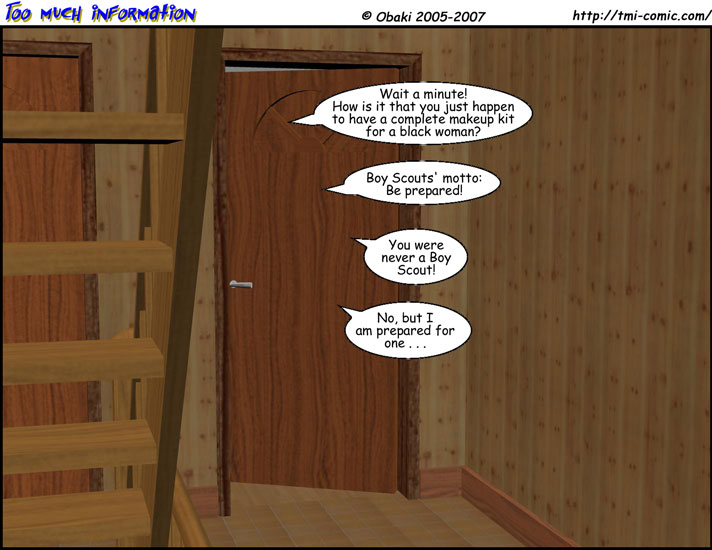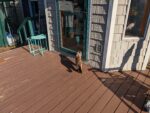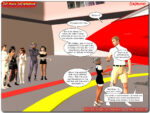Too Much Information – an online comic
An old house, a geek, a cute transvestite, a very tall lesbian, and at least one ghost–what could happen? – Adult situations and artistic nudity. Not suitable for children.
- Before Commenting
- About TMI
- Web Novel(s)
- Aelfheim
- CHAPTER 1–NAIVETY
- CHAPTER 2–CONFUSION
- CHAPTER 3–FEAR
- CHAPTER 4–COMPASSION
- CHAPTER 5–PASSION
- CHAPTER 6–EFFORT
- CHAPTER 7–DEFIANCE
- CHAPTER 8–RELAXATION
- CHAPTER 9–DECEIT
- CHAPTER 10–DISTRACTION
- CHAPTER 11–CONVERSATION
- CHAPTER 12–DREAM
- CHAPTER 13–FUGUE
- CHAPTER 14–BATTLE
- CHAPTER 15–AFTERMATH
- CHAPTER 16–SOLACE
- INTERMISSION
- CHAPTER 17–RESURGENCE
- CHAPTER 18–REVELATION
- CHAPTER 19–REFRESHMENT
- CHAPTER 20–DISCLOSURE
- CHAPTER 21–DEPARTURE
- CHAPTER 22–MEMORY
- Aelfheim
- Privacy Policy
- Archive
| S | M | T | W | T | F | S |
|---|---|---|---|---|---|---|
| « Oct | ||||||
| 1 | 2 | 3 | 4 | |||
| 5 | 6 | 7 | 8 | 9 | 10 | 11 |
| 12 | 13 | 14 | 15 | 16 | 17 | 18 |
| 19 | 20 | 21 | 22 | 23 | 24 | 25 |
| 26 | 27 | 28 | 29 | 30 | 31 | |
Control Panel
Blog Categories
Blog Archive
Recent Posts
- ComicPress 2024-10-04
- Tech difficulties 2024-09-23
- What’s stopping me… 2024-04-14
- Andy is doing better 2023-12-18
- I can’t see…?! 2022-09-27
Recent Comments
- Opus the Poet on Caste In Space
- Opus the Poet on Ready For Love
- Opus the Poet on Ready For Love
- Opus the Poet on Caste In Space
- Opus the Poet on Like Hell
- Anonymousbosch on Butch and Sundance on ‘Nip
- roundman on ComicPress
- scurvy on Butch and Sundance on ‘Nip
- Ben on Butch and Sundance on ‘Nip
- Mike Conner on Butch and Sundance on ‘Nip
- Opus the Poet on 2015-12-09
- Bobby on Butch and Sundance
- Opus the Poet on Family Matters
- Alan Cooper on Butch and Sundance on ‘Nip
- Opus the Poet on Family Matters
- anarchduke on ComicPress
- Opus the Poet on 2016-11-28
- Opus the Poet on 2008-01-02
- Hinoron on Butch and Sundance on ‘Nip
- Hinoron on Butch and Sundance







The rest of that motto was originally “… to die for your country.”
The boy scouts were originally a branch of the military, after all. Their job was to sneak through the wilderness, find the enemy army, and report back things like numbers or men, horses, equipment, and troop movements.
They were BOY scouts, because if a foreign army finds a kid sneaking around the woods around their encampment, they might be a little less likely to slit his throat than if they found an adult doing that. Emphasis on “a little”. Also the boys were usually too small to do the work of proper soldiers, so they were considered expendable.
…which brings us back around to making young boys repeat over and over that they should “be prepared to die for your country”.
I’m curious where you got this information, because despite having a long association with Scouting (my brother made Eagle Scout and I participated in Girl Scouts) I’ve never heard this story. The closest analogy would be Hitler’s Youth Groups (which took place long after Scouting was here in the USA) with a second being in England where Scouts did aid in the Coastal Watch. In the USA they never got closer to military action than helping to gather supplies needed for the war effort. A task shared with most ablebodied people not serving overseas.
https://en.wikipedia.org/wiki/Scout_Motto
“Scouting for Boys” book by Lord Baden Powell, acknowledged founder of the Boy Scouts.
In the chapter on patriotism, he writes: “Be Prepared to die for your country if need be, so that when the moment arrives you may charge home with confidence, not caring whether you are going to be killed or not.”
I seem to have offended a few people here.
My next question: What do you think a “scout” is, or the verb, scouting? Not the Boy Scout (with capital letters), with their scarves and sashes full of badges; just a regular scout. What is it? Your answer should be, it’s a thousands-year-old sub-unit of any army whose job is to run ahead of the main force and scout (there’s that verb again) the lay of the land, positions of enemy forces, any obstacles or problems with the army’s planned marching route, and report back. Scouts often do their jobs alone, moving through wilderness, camping in forests, etc. All skillsets taught by the Boy Scout movement. In part because they’re alone, they run a high risk of being captured (after all, the enemy army has scouts and lookouts too.) Typically, you get assigned to a scout unit if you’re not big and strong enough yet to hold up a sword and shield, or heavy armor (in other words, a boy).
You’ve got a few errors in your understanding of the situation. Boy Scouts were never considered part of the military. According to the origin of Scouting the following was written.
In 1899, during the Second Boer War in South Africa, Baden-Powell successfully defended the town of Mafeking in a siege that lasted seven months. Baden-Powell’s troops were vastly outnumbered so he used local boys to administer first aid, carry messages and run errands.
Note. the boys performed non combat functions only, there were a number of times that women and children would perform such tasks as well as distribution of water, ammunition and food,. The closest they officially got to combat would be to load weapons for the troops so they could fire at the enemy uninterrupted. I’d also like to point out that the boys being discussed from the Boer War would have been local boys. The only functions taught to the Scouts back in England would have been non combat sorts of tasks.
As for “Be Prepared” it is not an oath, but rather a motto. The original oath speaks of duty. but not death.
Before he becomes a scout, a boy must take the scout’s oath, thus:
‘On my honour I promise that—
I will do my duty to God and the King.
I will do my best to help others, whatever it costs me.
I know the scout law, and will obey it.’
Understand. I feel no offense at your words. they just don’t match either my research nor my experience with Scouting.
You are either an idiot or a troll, which brings us back to the first choice. Two seconds on a search engine will show how far out there you are. And if you were trying to be funny? You failed, miserably.
The boy scouts were create because the Army printed a manual ‘The Scouts Handbook’ which was part camping instructions, part survival guide, and part military guide for scouting enemies. Boys thought it was cool, and were buying it to do the things in it. One child advocate though it was dangerous, so rewrote it to remove the dangerous parts, and add other life lessons he felt would help the boys. Thus ‘The Boy Scouts Handbook’ was created, the organization was created later.
Source: (paraphrased) The Boy Scouts Handbook (circa 197?) (different printings might not include this)